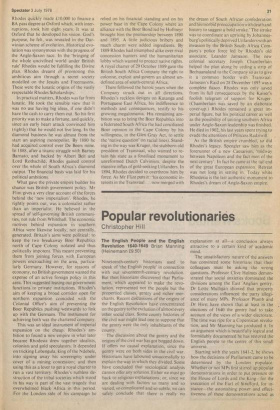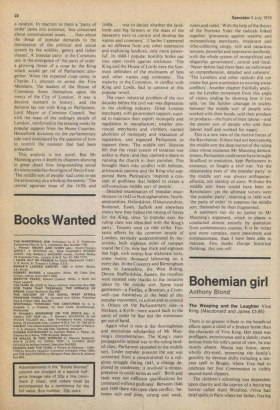Popular revolutionaries
Christopher Hill
The English People and the English Revolution 1640-1649 Brian Manning (Heinemann £9.50) Nineteenth-century historians used to • speak of 'the English people' in connection with our seventeenth-century revolution. But then historians discovered that Parliament, which appeared to make the revolution, represented not the people but the propertied classes, gentry and richer merchants. Recent discussions of the origins of the English Revolution have concentrated on the gentry to the exclusion of almost every other social class. Some county histories of the civil war might lead one to suppose that the gentry were the only inhabitants of the county.
The discussion about the gentry and the origins of the civil war has got bogged down. If offers no causal explanation, since the gentry were on both sides in the civil war. Historians have laboured unsuccessfully to explain the way in which they divided. Some have concluded that sociological analysis cannot offer any solution. Either we must go back to religious explanations; or, since we are dealing with factors so many and so varied, so complicated and so subtle, we can safely conclude that there is really no explanation at all—a conclusion always attractive to a certain kind of academic mind.
The unsatisfactory nature of the answers has convinced some historians that their colleagues must be asking the wrong questions. Professor Clive Holmes demonstrated that social anxieties dominated the divisions among the East -Anglian gentry. Dr Lotte Mulligan showed that property considerations influenced the party allegiance of many MPs. Professor Plumb and Dr Hirst have shown that at least in the elections of 1640 the gentry had to take account of the views of a wider electorate. The time was ripe for a Copernican revolution, and Mr Manning has produced it. In an argument which is beautifully logical and formidably documented he has restored the English people to the centre of this small universe.
Starting with the years 1641-2, he shows how the decisions of Parliament came to be determined by the London populace. Whether or not M Ps first stirred up popular demonstrations in order to put pressure on the House of Lords and the King--for the execution of the Earl of Strafford, for instance—the astonishing power and effecttiveness of these demonstrations acted as a catalyst. In reaction to them a 'party of order' came into existence, 'less concerned about constitutional issues . . . than about the threat of popular demands to the domination of the political and social system by the nobility, gentry and richer classes'. A 'popular party' in the Commons saw in the emergence of 'the party of order' a growing threat of a coup by the King which would get rid of Parliament altogether. When the expected coup came, in Charles l's attempt to arrest the Five Members, 'the leaders of the House of Commons threw themselves upon the mercy of the City of London'. It was 'a decisive moment in history', and the decision lay not with King or Parliament, Lord Mayor or Common Council, 'but with the mass of the ordinary people of London', reinforced in the ensuing weeks by popular support from the Home Counties. Henceforth divisions on the parliamentary side were dominated by the question of how to control the monster that had been unleashed.
This analysis is not novel. But Mr Manning gives it depth by chapters showing in great detail how long-standing social divisions underlay the origins of thecivil war. 'The middle sort of people' had come to see the aristocracy as a whole as the enemy. 'The central agrarian issue of the 1630s and
1640s . . . was to decide whether the landlords and big farmers or the mass of the peasantry were to control and develop the wastes and commons'. 'Charles I appeared as no different from any other oppressive and exploiting landlord, only more powerful'. In 1640-1 popular hostility broke out into open revolt against enclosure. 'The King and the House of Lords were the foremost defenders of the enclosures of fens and other wastes and commons'. The majority in the Commons, in conflict with King and Lords, had to connive at this popular revolt.
The main industrial problem of the two decades before the civil war was depression in the clothing industry. Great London merchants, with government support, wanted to maintain their export monopoly and regulation in manufacture: smaller provincial merchants and clothiers wanted abolition of monopoly and relaxation of regulation, and expected Parliament to support them. 'The middle sort' likewise felt that the royal system of taxation was unfair to them: and they claimed a share in running the church in their parishes. This brought them into conflict with bishops, aristocratic patrons and the King who supported them. Puritanism 'inspired a concept of godliness that helped to create a self-conscious middle sort of people'.
Detailed examination of 'popular insurrections' in 1642 in Nottinghamshire, Northamptonshire, Oxfordshire, Gloucestershire, Somerset, Essex, Suffolk and elsewhere shows how they halted the raising of forces for the King, since 'in popular eyes the ruling class was identified with the King's party'. Tenants went on rent strike. Fantastic efforts by the common people of London, seriously underestimated by historians, built eighteen miles of rampart round the City, nine feet thick and eighteen feet high, with twenty-four elaborate forts, some twenty thousand labouring on it every day. In the Coventry and Birmingham area, in Lancashire, the. West Riding, Devon, Staffordshire, Sussex, the royalists were resisted only thanks to the initiative taken by the middle sort. Some local gentlemen—a Fairfax, a Brereton, a Cromwell—put themselves at the head of this popular movement, to utilise and to control it. Others on the Parliamentary side—a Hotham, a Kyrle—were scared back to the party of order by fear lest the movement get out of hand.
Again what is new is the thoroughness and meticulous scholarship of Mr Manning's documentation. The King's main propagandist appeal was to the ruling landed class; Parliament appealed to the middle sort. Under popular pressure the war was converted from a constitutional to a religious struggle during 1643, a change deplored by moderates: it involved 'a reinterpretation in social terms as well'. 'Birth and rank were not sufficient qualifications for command without godliness'. Between 1646 and 1649 there was open class conflict, 'between rich and poor, strong and weak, rulers and ruled.' With the help of the theory of the Norman Yoke the radicals linked together 'grievances against wealthy and monopolising merchants, intolerant and tithe-collecting clergy, rich and rapacious lawyers, powerful and oppressive landlords, with the whole system of monarchical and oligarchic government', central and local. 'Never before had there been an indictment so comprehensive, detailed and coherent'. 'The Levellers and other radicals did not create but gave expression to existing social conflicts'. Another chapter fruitfully analyses the Leveller movement from this angle of vision, ending by showing how it too split 'on the further cleavage in society between ' the middle sort of people who worked with their hands, sold their produce or products—the fruits of their labour—and the poorer sort of people who sold their labour itself and worked for wages'.
This is a new view of the motive forces of the Revolution. If there had not been among the middle sort the deep hatred of the ruling class whose existence Mr Manning demonstrates, Parliament could never have brought Strafford to execution, kept Parliament in existence, or fought a civil war. Yet the relationship even of 'the popular party' to the middle sort was always ambiguous: alliance, not identity of aims. Without the middle sort there would have been no Revolution: yet the ultimate victors were 'the popular party', reuniting in 1660 with 'the party of order' to suppress the middle sort, themselves by then fragmented.
A summary can do no justice to Mr Manning's argument, which in places is conducted almost entirely by quotation from contemporary sources. It is far richer and more complex, more passionate and compassionate, than I have been able to indicate. Few books change historical thinking: this one will.



































 Previous page
Previous page